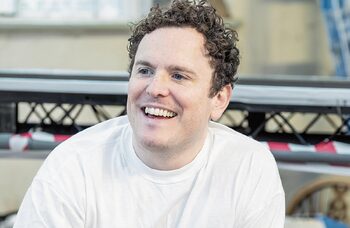Are covers and swings adequately prepared?
Beryl Rarely! A swing seems to have to take huge personal responsibility to get it right, without much back-up.
Jon The caveat here is that, of course, it depends on the venue and the producer, but in general, I’d say that ‘rarely’ about covers it. No pun intended.
Abi I think that the often-used practice of beginning to rehearse swings and covers after press night is short-sighted... but I do understand the time and budget implications involved.
Jon Spot on. I do think that’s changed subtly in the past few years too – there definitely used to be more rehearsals for covers during rehearsal.
Ros I think it depends on where and who you’re working for or with. I’ve had experiences of putting someone on when they have done no prep at all. Right now, I work in an organisation that has an excellent cover system and the understudies have been amazing.
Jon I think there’s also an issue around stage time. There’s only so much you can do in a rehearsal room to prepare someone to go on in a show that may have a load of technical elements.
Albert I think it’s down mainly to the conscientiousness of the understudy.
Abi I suppose length of contract also comes into it. When something is long-running enough to mean that there are contracted holidays, the covers and swings are given far more attention.
Jon The expectation to be ready to go on in previews, added to the fact of usually not rehearsing until after press, is such a clear and obvious contradiction.
Ros I have to say that, since the pandemic, the emphasis on ‘you could go on at any point’ has become much more of a thing.
Peter It’s a while since I’ve covered, but I remember that at the National Theatre and Royal Shakespeare Company we did have understudy rehearsals before opening. More recently doing commercial tours, I’ve seen rather inadequate cover rehearsals.
Jon If someone hasn’t been in the room much, ‘here’s a video, be ready to go on’ is one hell of an ask.
Peter Working at that level at the RSC – playing small roles and understudying leads in a repertoire season – is really hard work.
Jon The nuclear option, if you’re truly underprepared, is to say you’re not going to do it, of course. But contracted covers are in a bit of a bind when it comes to refusing to perform. There’s always something about ‘be ready to go on regardless of rehearsal’ in the contract now. You end up with stage management doing jobs that aren’t theirs, rehearsing covers on stage at the half because they’ve never done a fight or a dance or whatever.
Continues...
Albert Many years ago, when I was doing something in the West End, my understudy came up to me in rehearsals. He was playing a part in the show anyway. He said to me: “Please don’t be off. I don’t know it and I only took the responsibility for the extra £50 a week.” When he learned I had days off built into my contract, he was absolutely gobsmacked.
Ros I actually had to send an understudy on last night, the day after press, but he was ready because our cover system started back in rehearsals and he is extremely conscientious and did the work.
Jon In my experience, there tends to be a split on most shows between covers who really want to go on and covers who really don’t.
‘The show had to go on – even if the assistant director went on with the book’
Ros It comes down to time, resources, money and the individual.
Albert Understudying is a job and some people do it brilliantly, conscientiously and professionally. There are lots of actors who just take on cover responsibility without any thought.
Jon That’s quite right about the lack of thought. It applies to casting departments, too. Sometimes they load up people with cover parts, which is a lot of work, especially if the cover is in the main cast too.
Beryl I have been in a West End situation where the producers clearly did not care how prepped the cover was, the show had to go on – even if the assistant director (who was not an actor) went on with the book.
Jon Such little care for the audience, never mind the cast. ‘Thanks for your £100, here’s a non-actor reading from a script.’
Abi I think producers don’t consider what the actual implications are and how unsafe actors can feel. My friend just did a job in which someone became unable to go on and there were no covers, so the producer asked someone who worked behind the bar at the theatre to go on.
Beryl The bartender?! How explicit in their lack of care.
Peter Of course, in a Hollywood show, the bartender would become a star!
Meet our panellists
We have given our panellists pen names and used stock images, but their biographies reflect their real career details
Ros Clifford is in her 30s. Currently a deputy stage manager, she has worked extensively in London and regional theatre for nine years
Abi Egerman is in her 20s and has appeared at the Old Vic, the National Theatre, and in regional rep
Albert Parker is in his 60s and has appeared as a regular in soaps, two BAFTA-winning sitcoms, theatre and TV
Beryl Phoenix is in her 40s. She has played leading roles at the Royal Shakespeare Company, worked on new plays, and toured both nationally and internationally
Most Read
Across The Stage this weekYour subscription helps ensure our journalism can continue
Invest in The Stage today with a subscription starting at just £7.99













